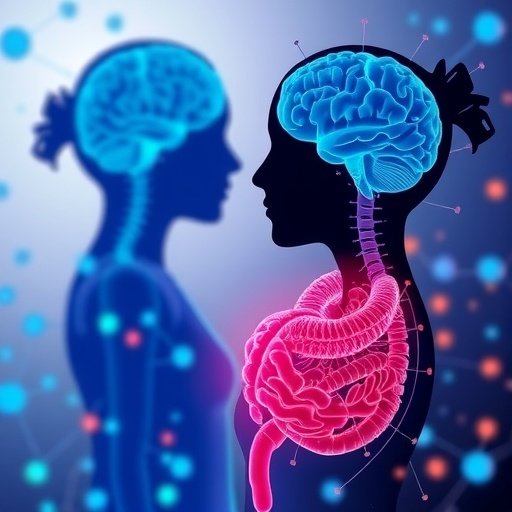In recent groundbreaking research, a multi-omics approach has illuminated the intricate clinical-gut-brain interactions particularly evident among female patients diagnosed with Irritable Bowel Syndrome (IBS) who have experienced adverse childhood events. This study, led by researchers including Binod M., Chang L., and Hung M.W., showcases how personal history, specifically trauma, can influence gut health and, consequently, overall well-being. The comprehensive analysis integrates various biological data layers—genomic, transcriptomic, proteomic, and metabolomic—thereby providing a more complete picture of the links between psychological trauma and gastrointestinal dysfunction.
Irritable Bowel Syndrome is a complex disorder characterized by recurrent abdominal pain, bloating, and altered bowel habits. The condition presents a higher prevalence in women, prompting scientists to investigate whether biological factors intertwined with personal histories could shed light on the disorder’s etiology. The participants in this study were female IBS patients, chosen specifically for their reported experiences of adverse childhood events, which constituted a critical variable in the assessment of their health outcomes.
This research employed cutting-edge methodologies that meticulously examined the interplay between genetic markers and environmental exposures. By using advanced omics technologies, the study unraveled a series of biomarkers that correlated with both the psychological distress stemming from childhood experiences and the physiological manifestations typical of IBS. The findings suggest that early-life stressors may initiate a cascade of biological changes affecting gut microbiota and metabolic pathways, elucidating a potential pathway for developing innovative therapeutic strategies.
Participants underwent detailed clinical evaluations alongside sophisticated biological testing. These assessments involved not only psychological screenings aiming to quantify adverse childhood experiences but also comprehensive gut health analyses. The usability of multi-omics data allowed researchers to pinpoint specific alterations within the microbiome, providing insights that traditional methods may overlook. Those changes could elucidate why women with traumatic childhood experiences are disproportionately affected by gastrointestinal disorders.
Among the many revelations of this study, one notable outcome is the identification of distinct microbial signatures in the gut of affected individuals. Such signatures not only correlate with the severity of IBS symptoms but also reveal pathways by which psychological stress may influence gut health. Researchers proposed that stress-mediated changes to gut microbiota could potentially lead to dysbiosis—a microbial imbalance that is increasingly recognized as a contributor to IBS and other related gastrointestinal conditions.
The implications of this research extend far beyond the realm of IBS. The study associates gut health with mental well-being, reinforcing the gut-brain axis concept. This bidirectional communication between the gastrointestinal system and the central nervous system is pivotal in understanding how emotional and psychological states can manifest physically, thus offering a potential therapeutic target for treating IBS. The evidence supporting this connection can pave the way toward integrative treatment models encompassing both psychological counseling and dietary modifications.
Moreover, the findings stress the importance of personalized medicine, particularly in psychiatric and gastrointestinal care. Previous treatment paradigms often inadequately addressed the psychological backgrounds of patients; this study underscores how a more holistic understanding of patients’ histories might significantly enhance treatment efficacy. By integrating psychological and biological considerations, healthcare providers can tailor interventions that not only address symptom relief but also the root causes of the conditions.
Future studies building upon these findings will be essential to establish causality and to explore interventional strategies. Investigating how lifestyle, dietary changes, and supportive psychological care can influence the immuno-metabolic pathways uncovered in this research could revolutionize the way IBS is approached clinically. Moving forward, the prospect of utilizing gut microbiome modulation as a treatment strategy offers a tantalizing glimpse into the future of gastrointestinal health management.
This multi-faceted approach not only revolutionizes our understanding of IBS but also lays the groundwork for broader implications in treating various comorbid conditions, such as anxiety and depression, that often accompany chronic gastrointestinal disorders. Collaborative efforts between gastroenterologists, psychologists, and nutritionists will be crucial in translating these research findings into clinical practice effectively.
In summary, the study conducted by Binod et al. reflects a significant step forward in the healthcare domain, shining light on critical connections between early life experiences, mental health, and physical conditions. The advancements in understanding the biological mechanisms at play indicate not just innovative therapeutic avenues, but also a paradigm shift in how we understand and treat gut and brain interactions. The integration of multi-omics in clinical research presents an exciting frontier that holds the potential to transform patient care pathways and improve health outcomes for vulnerable populations.
As further investigations unfold in this dynamic field, we anticipate the emergence of new insights that can refine our approaches to complex conditions like IBS. This intersection of biology and psychology represents a rich area of exploration that is poised to yield compelling results, ultimately fostering a more holistic understanding of health and disease.
Subject of Research: Clinical-gut-brain interactions in female IBS patients with adverse childhood experiences
Article Title: Multi-omics analysis reveal clinical-gut-brain interactions in female ibs patients with adverse childhood experiences
Article References: Binod, M., Chang, L., Hung, M.W. et al. Multi-omics analysis reveal clinical-gut-brain interactions in female ibs patients with adverse childhood experiences. Biol Sex Differ 16, 101 (2025). https://doi.org/10.1186/s13293-025-00757-w
Image Credits: AI Generated
DOI: https://doi.org/10.1186/s13293-025-00757-w
Keywords: Multi-omics, IBS, gut-brain axis, childhood trauma, microbiome, personalized medicine
Tags: adverse childhood events and gut healthbiomarkers in irritable bowel syndromeclinical implications of gut-brain linkscomplexities of irritable bowel syndromefemale IBS patientsgenetic markers and environmental exposuresgut-brain interactions in IBSimpact of childhood trauma on healthintegrative analysis of biological data in IBSmulti-omics approachomics technologies in health researchpsychological trauma and gastrointestinal dysfunction





